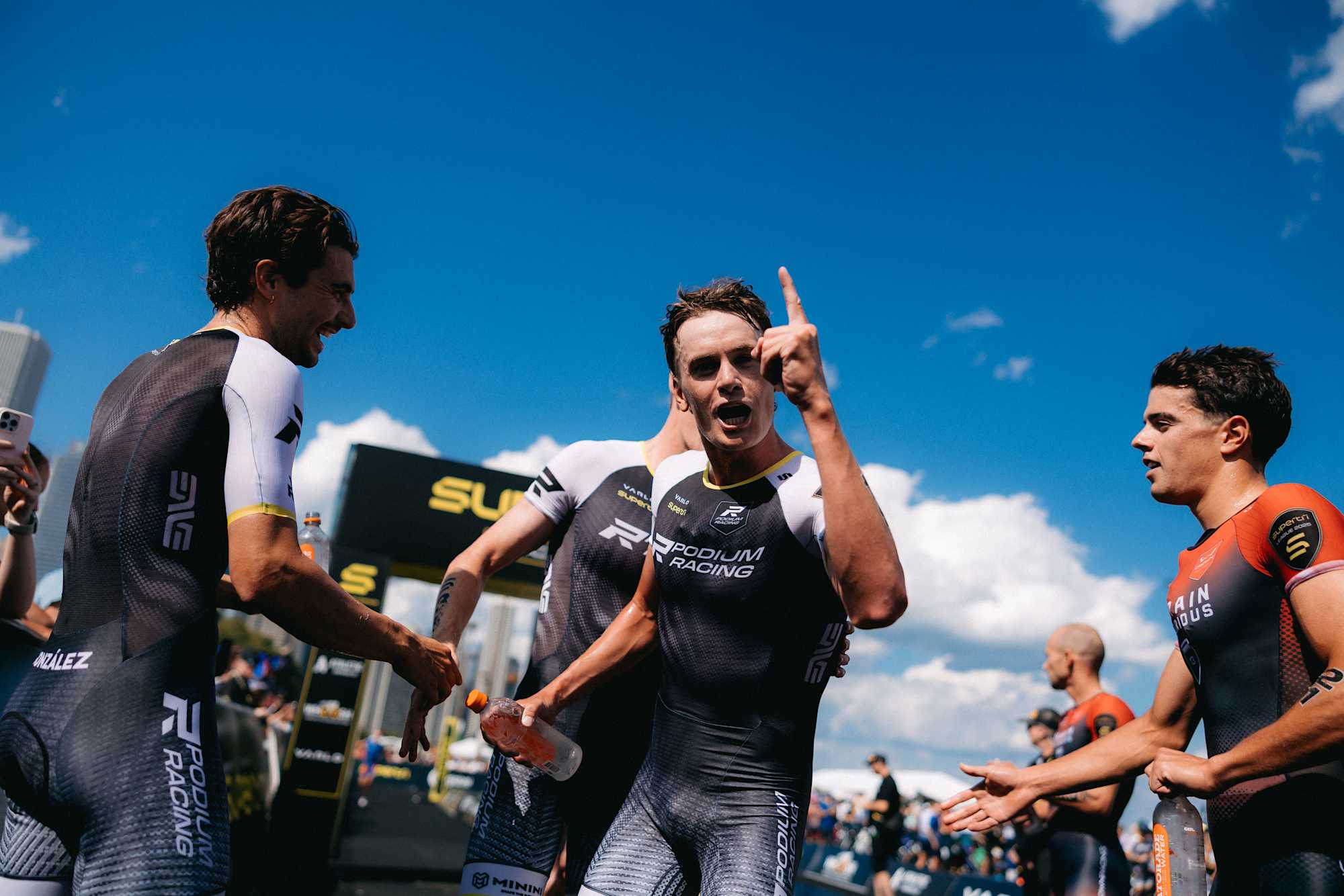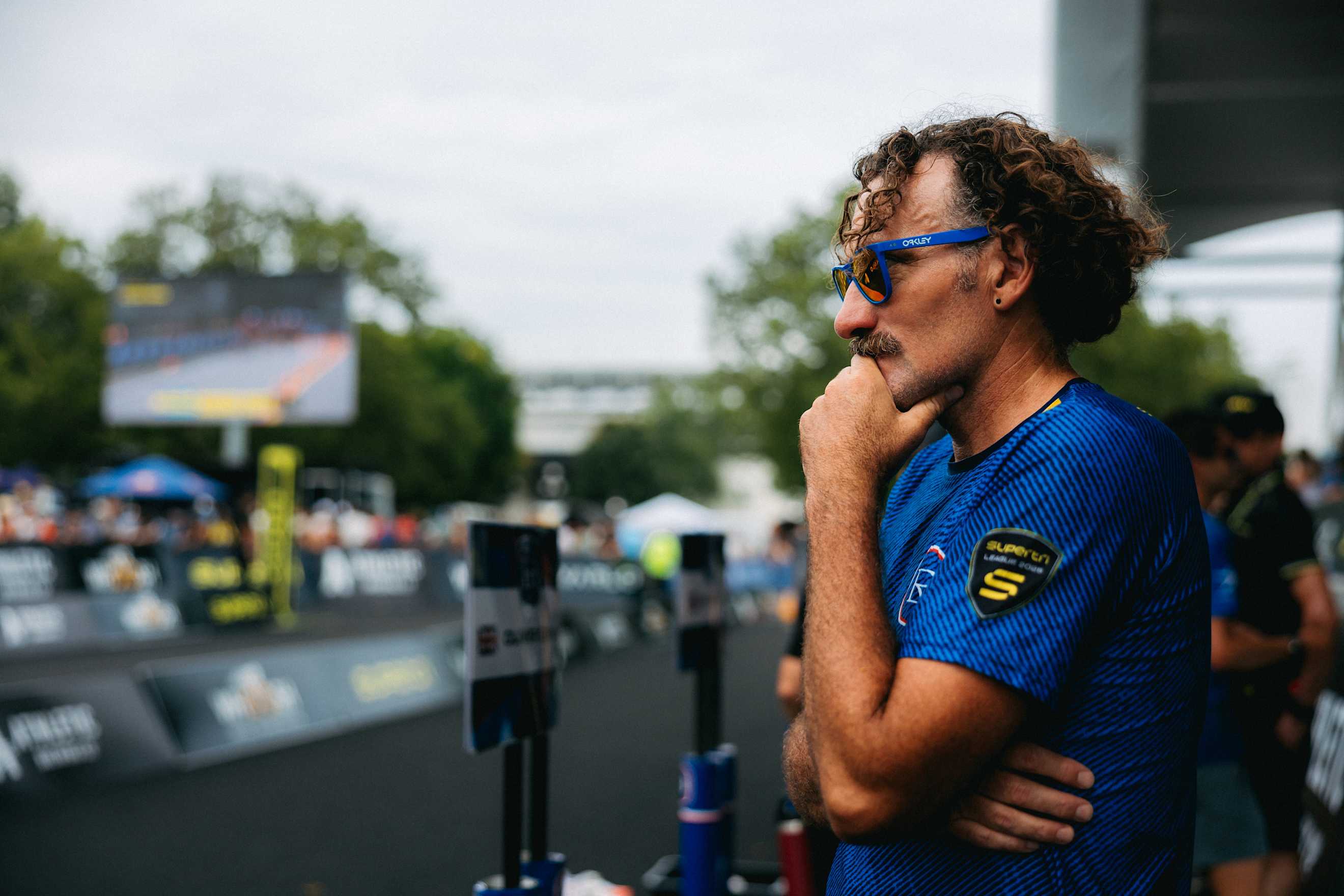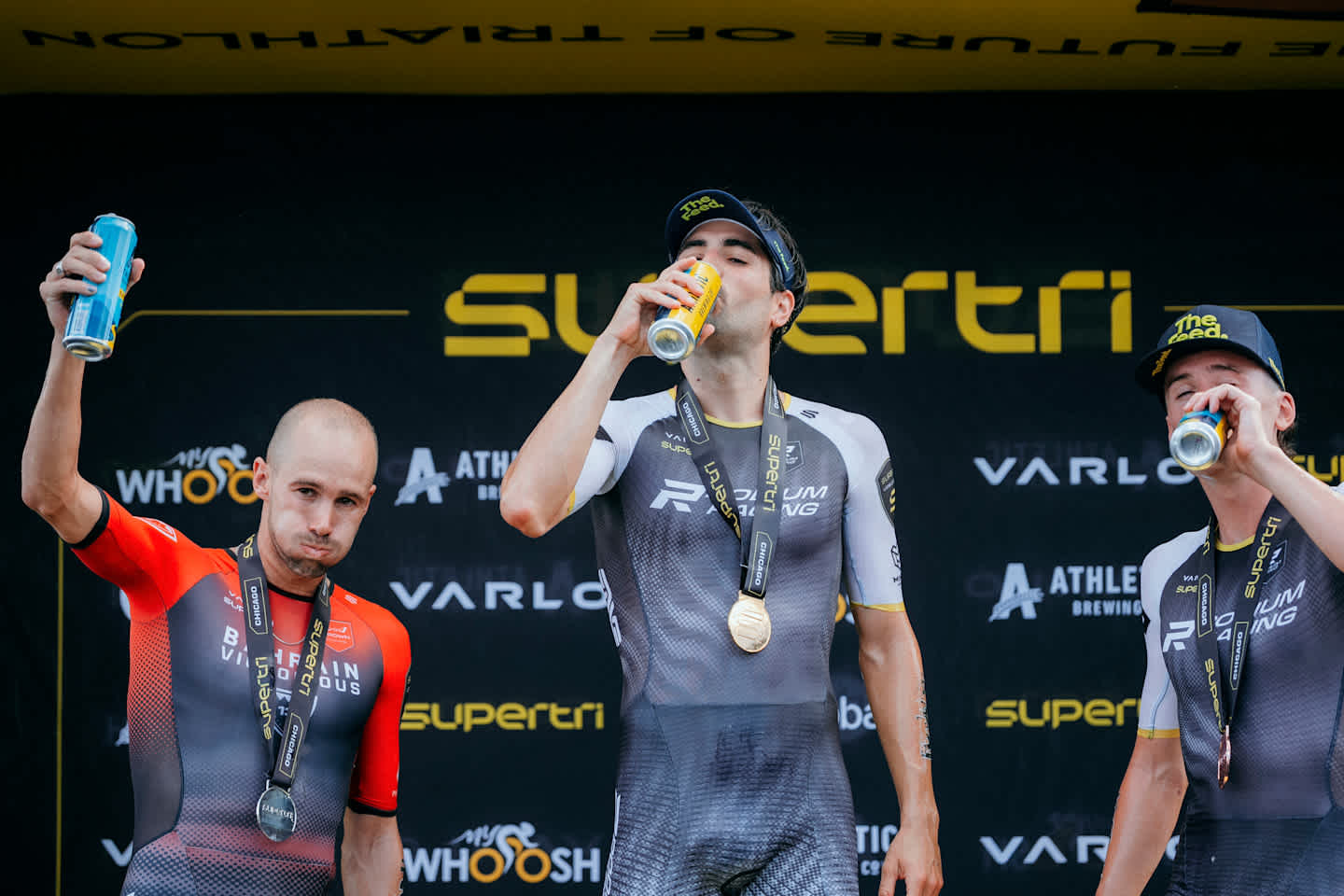
Podium Racing: From Setback to Strength
Podium Racing finished second in its debut Supertri year in 2024, close behind champions Crown Racing, sparking hopes of a title victory coming into 2025. A plan was in action, but plans change.
Second seasons always come with the lingering anxiety of a sophomore slump, but John Anthony has not had time to think about such superstition.
Podium Racing finished second in its debut Supertri year in 2024, close behind champions Crown Racing, sparking hopes of a title victory coming into 2025. A plan was in action, but plans change.
Anthony, a Director of Product at Oura Ring, has dedicated decades of his life to wearable technology after experience in computer science and IT. A data-driven entrepreneur, he transitioned from athletics to triathlon in his late twenties, becoming integrated into the sport administratively when his son found talent in swimming, cycling and running.
His journey to Supertri came through a love for short course draft-legal racing, enjoying the similarities in the formats. While loving time on his feet, he is clearly even more passionate from the sidelines. He has worked with USA Triathlon as a coach and acted as an ambassador for the USA Triathlon Foundation.
With experience creating several high-tech start-ups, Anthony initially formed the Podium Coaching Group – focusing on high-performance coaching for clients. This later evolved into purchasing a Supertri franchise, with the coaching business eventually sold to further invest in what became known as Podium Racing.
The team focused on building a roster of strong athletes, including Olympic bronze medallist Leo Bergere, Dorian Coninx, Kenji Nener, Jeanne Lehair and Leonie Periault. However, there was also focus on providing opportunities for rising stars.
Joining him as team manager in 2024 was Tim Don, previously in charge of SLT Eagles, one of the hot prospects behind the scenes. He was a pivotal part of Podium’s success last year.
“I’ve said this a couple of times and it’s worth repeating, Tim is a phenomenal person and a phenomenal team manager,” said Anthony. “I really enjoyed working with him. He can moneyball the short course racing scene better than anybody else can.
“He has a keen awareness of the athletes, next-generation athletes, and who’s performing well at any particular point in time. He really invests time in watching World Triathlon races.”
But Don found an offer he could not refuse – joining Brownlee Racing in June, just one month before the start of the 2025 season. It caused an abrupt restructure for Anthony.
While he said he was “very happy” for Don and thought it was a “natural fit” having the former British teammates reunited, he was disappointed with the decision made at short notice.
“Memories that I’m less happy with would be just the way that it unfolded,” added Anthony.
��“Tim came on board to Podium Racing, not just as a team manager, but as a co-founder and this was really important to him; and frankly, it was really important to me as well, because I wanted the team manager to be invested in the platform we were building and the vision that we were establishing.
“That required more than just a transactional team manager contract and required somebody to be really part of building out this venture.
“The timing of it was not great and honestly, I feel like I would have appreciated a little bit more devotion given the relationship and the agreement that we had in building Podium Racing to see through this particular season – but it is what it is.”
While the departure caused a sense of urgency, it allowed Podium to rethink its whole set-up. Anthony admitted the pair had different views on team selection, and said supporting next-generation athletes was paramount and is one of the “clear components” of the team’s mission. Becoming the interim team manager allowed him to see the team from a different perspective.
“One of the things you learn in product development is you have to pivot often and find success in a different approach,” he said. “That’s what we’ve done through the restructuring of our team and me taking on the team manager role.”

While his ace Bergere departed, the team was bolstered by strong debutants such as Alberto Gonzalez Garcia and John Reed, as well as Periault and Lehair starting the season in form.
Anthony also appointed Nener and Lehair into team captain roles, providing two of the most experienced Supertri athletes a chance to pass their knowledge onto rookies, adding that they lend their expertise to him and his support team on team tactics and act as ambassadors for Podium off the course too.
Despite the major setbacks to the team, they adapted well at the season opener in Toronto, marginally finishing third behind Brownlee Racing, with Periault placing second in the women’s race, Reed finishing in the top five of the men’s, and Gonzalez Garcia taking fourth place in his Supertri debut.
The added caveat of the Eliminator format changing the dynamic of the racing in this opening event may have been daunting, but Anthony said it was crucial to “ignore that chaos.”
“I’m very happy with the team,” he said. “We showed up, we delivered, we were only four points off of second place, which is roughly where I thought we would be.
“Alberto showed up for the first time racing Supertri and impressed with a strong fourth-place finish. He hadn’t been planning to race Chicago, but after his result in Toronto, he crossed the finish line and came straight to me saying, ‘I’m in for Chicago, right?’ He had the bug — and he went on to race in Chicago, where he dominated the men’s field to claim his first Supertri race win.”
Lehair was equally impressive in Chicago, producing a commanding performance of her own to claim the women’s race win. The double race win in Chicago marked a statement weekend for Podium Racing and underlined the team’s depth across both men’s and women’s competition.
“I think Alberto now sees that he has the capability to go for an overall podium in this sport for this season. And Jeanne’s win was a phenomenal display of her leadership as both an athlete and a team captain,” said Anthony. “I was really happy with the team, and I’m really glad to see that we’re giving folks like Alberto an opportunity while also seeing experienced athletes like Jeanne flourish.”
He was also quick to point out Periault had a “phenomenal” race and was in great form, while praising next-generation athlete Reed for representing the “values and the ethos that we want on this team,” tipping him to be the American ace heading into the Los Angeles 2028 Olympic Games.
Remaining committed to data analysis, Anthony noted that fixing tiny errors could lead to marginal gains. On two occasions, he mentioned his athletes had great opportunities to claim short chutes on the swim and the run, but came up short due to tactical mistakes.
“If those two things had happened differently, we would have been ahead of Brownlee Racing and gone into Chicago in second place,” he said.
“That’s the healthy discussion we want to be having as a team, and those are the kinds of reflection opportunities we carried into Chicago and will continue to build on for the next races.
“It’s easy for us to look backwards and diagnose and assess what was happening in the race, but these athletes have to make these decisions in real time. So, I fully appreciate that.”
While Anthony is passionate about technical improvements, teamwork is clearly at the heart of his team’s ethos.
“It’s really, really important to me and the team, that we have the right athletes representing us and being a part of this process,” said Anthony.
“I’d rather come in second place with the right team than first place with the wrong team.
“So having individuals who understand what we’re doing, what our mission is, what our vision is, and the fact that we are building a team, not a team of individuals, is just as important, if not more important to me than their world ranking or how they’re performing.
“It’s a very select set of individuals who have the opportunity to race on either one of these teams.
“There will be athletes who look at our mission and say, ‘I don’t think I’m interested in racing for a team year-round, or I don’t know if I’m aligned with giving next-generation athletes an opportunity.’
“That’s probably hard to argue against, but it means that our athletes need to be committed to that as part of the process.
“When we select our brand partners, we have to have a shared ethos in terms of what we’re doing, what our story and what our roadmap looks like, and the kind of impact that we want to have. This ripples through everything that we’re doing on a day-to-day basis.
“This team is not for everybody, but who it is for, I think we will create a platform of impact.”

This impact has clearly already rubbed off on their high-flying debutants in Toronto and Chicago, but also on Periault. Her first World Triathlon Championship Series victory coincided with her joining the team last year and by the end of the year, she won silver at the European Championships.
She has had three top five finishes this season on the World Triathlon Championship Series circuit too, including a win weeks before Supertri started, in Hamburg. It shows the investment in prospective athletes has paid off for the team – meaning they do not inherit stars, but buy into them before they get there. The team owner said this might be a “sacrifice” in the short term, but would pay dividends in the medium and long term.
Don’s departure was a chance for Anthony to have a hands-on approach, so that he could “experience every aspect” of the organisation.
“I find that I can do my best work when I have a view as to how all of the components are working,” said Anthony.
“When Tim was the team manager last year, there was a whole set of responsibilities from recruiting, to athlete conversations, to contracting, to being on the course on race day supporting the athletes that I didn’t as a team owner, sitting in a VIP tent.
“I didn’t have direct access, but now I do. That gives me a better appreciation for where we’re strong, maybe where we need to improve, maybe where we need some additional support that we don’t have.
“For me, it’s really a gift.
“I’d rather step up as team manager and use that as a short-term learning opportunity and give us the right runway to go find the right team manager for Podium Racing. By the end of the season and certainly going into next year, we will have learned what’s working well and what’s not working well and we’ll revise that and adjust that role in order to have the best fit that we can going forward.”
He stresses he has taken the role on an interim basis and that this is a “temporary assignment” before returning to his position as team owner. While he is keen to give someone else the reins, he also sees it as imperative to select the right person for the job who “believes in our vision and our mission” and is “in it for the long haul.”
What will continue is the team captain positions, with Anthony noting that experienced athletes in leadership roles can be beneficial to a newly-appointed manager and act as a bridge between them and the rest of the athletes.
Going forward, following the Supertri stop in Chicago, Anthony continues to return to Podium Racing’s core values to ensure they remain on a successful path.
“We want to build the most successful international triathlon team ever to be built. That is goal number one,” he said, stating he would like to expand Podium Racing across different disciplines and distances.
“We want to support next-generation athletes, both in terms of racing opportunities, financial support, mentorship, all of these components are important for what we’re trying to build.
“Third, we want to use Podium Racing as a platform to empower individuals of all backgrounds to improve their personal health and fitness.
“I think we have an important platform to be talking about why being active is so important and, to an extent, what the role of wearables is in supporting that active lifestyle.”
You get the sense speaking to Anthony that he feels the emotional impact of setbacks and speaks candidly about that. However, the upside of this is his passion and his ability to adapt to those moments where he is knocked down.
Becoming the most successful international triathlon team may be an ambitious goal, but it is hard not to be convinced by his message of personal and physical development of his athletes, and the impact technology can have on the sport as a whole.
Podium Racing are clearly not content with their namesake, adamant that their performances and their athlete pathway are gold standard.





